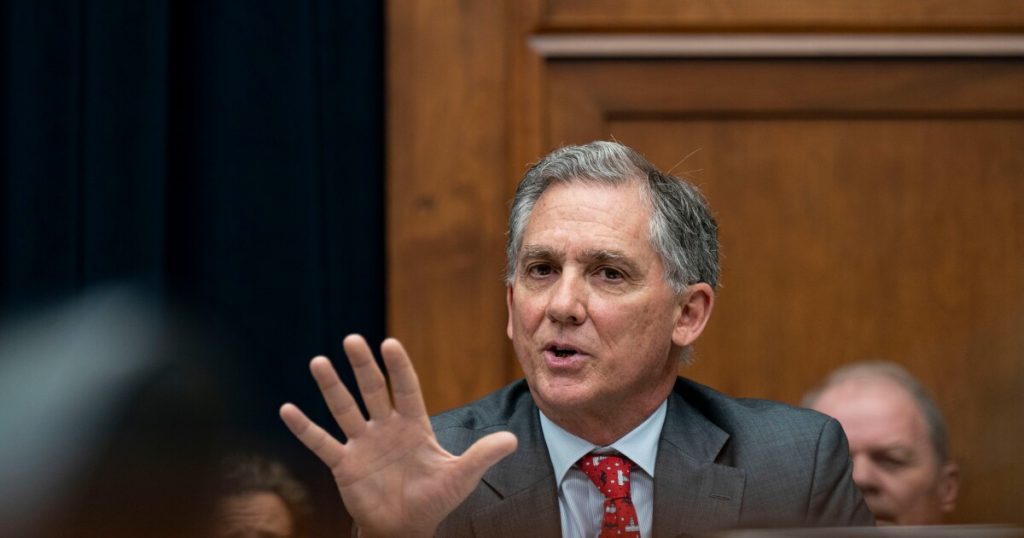- What’s at stake: American families face the prospect of losing their life savings to increasingly sophisticated criminal fraud networks.
- Forward look: Republicans seek whole-of-government coordination to combat fraud, while Democrats say GOP cuts to the Consumer Financial Protection Bureau enables fraud.
- Expert quote: “Banks cannot fight this battle alone. Other stakeholders must step up.” — Paul Benda, American Bankers Association
WASHINGTON — House Republicans called for sweeping federal coordination to combat financial fraud at a subcommittee hearing on Thursday.
The banking industry warned lawmakers that financial institutions cannot fight fraud alone, calling for a whole-of-government approach to tackle criminal networks that have grown increasingly sophisticated.
Paul Benda, executive vice president of risk fraud and cybersecurity at the American Bankers Association, said at the hearing that fraudsters have “invested the 300 billion stolen during the pandemic to build highly organized networks that now use deep fakes, spoofed caller IDs, stolen checks and fake social media accounts to target Americans.”
“This is where banks face a critical limitation. By the time a victim is ready to send a payment, they often believe they know and trust the scammer,” Benda said. “Caller ID might display the bank’s name, a text message might look identical to a legitimate fraud alert, a social media ad might appear to come from a trusted company.”
The issue of fraud is a difficult one politically for banks, who are often in a position to find and prevent some fraud, but who have long argued that they can’t be held liable for it because it would only increase the incentive for fraudsters to target bank consumers.
Republicans, echoing ABA’s sentiment at the hearing, called for a more expansive approach than focusing on bank regulators and institutions.
“These are tools banks do not control,” Benda said. “That is why banks cannot fight this battle alone. Other stakeholders must step up.”
Rep. French Hill, R-Ark., the chairman of the full House Financial Services Committee, said at the hearing that he has personal experience with financial fraud, and that his family was hit with wash checks via the Postal Service.
“I want to credit my bank for finding it and recognizing the fraud and stopping it and helping work with the FBI and the local police to put the people in jail, which I was happy to do,” Hill said. “But there are millions of people around the country that that’s not happening to.”
One of the issues, Hill suggested, was that there’s no larger government effort that spans agencies outside of the banking world.
“There’s not a directive from the top that anti-scam activity is a leading priority for law enforcement, and one of the actions that we believe can be facilitated by naming scams as a national priority,” said Kate Griffin, a director at the Aspen Institute Financial Security Program, in response to Hill. “To mount a coordinated response is to direct law enforcement to create greater resources towards those kinds of collaborations, because, as you rightly mentioned, they will yield benefits.”
Hill said that this effort would need to expand in Congress as well.
“It’s a cross-Congress problem,” he said. “I mean, you know, we don’t control the FTC on this committee, and yet, the FTC and the FCC should be very involved here, due to the transmission means that you’ve all addressed, like in telecommunication-based scams.”
The issue of addressing financial fraud — particularly as it relates to elder abuse — has a good deal of bipartisan support. Democrats said that part of this effort needs to include the Consumer Financial Protection Bureau, which the Trump administration is currently trying to
“Currently, an effort is afoot to remove some 1,500 of the personnel from the CFPB,” said Rep. Al Green, D-Texas. “We need a central point of contact for consumers. Well, that sounds like a Consumer Financial Protection Bureau, which is being eviscerated. This hearing is quite amazing to me. We want to help consumers, but we’re eviscerating the agency that helps consumers.”
Carla Sanchez Adams, a senior attorney at the National Consumer Law Center, brought up cases that the CFPB, under current leadership, has dropped that involve financial fraud.
“The CFPB, in January of 2025, entered a consent order against the owner of Cash App for fraud that was happening there,” she said. “Now, under that order, they’re supposed to receive consumers and victims who were impacted by unauthorized use that should have already gotten their money back. However, they haven’t received a Banking Herald Reader yet, and part of that is there’s a reduced workforce that is not able to do the work that it’s supposed to be doing for that reason. So I agree with you that we need to restore the strength of the CFPB.”

